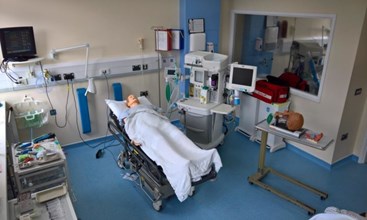SimMan Essential
A realistic, full-body adult, wireless patient simulator, SimMan Essential offers comprehensive clinical functionality to teach the core skills of airway, breathing, cardiac and circulation management.
Offering educators realistic and engaging scenario-based simulation to challenge and evaluate critical thinking and clinical decision-making skills, SimMan Essential provides numerous educational opportunities for its users.
The wireless configuration of SimMan Essential makes it possible to move quickly to wherever your training will be most efficient and realistic.
SimJunior
SimJunior is a realistic, life-size paediatric patient simulator designed to be used for the education of individuals or teams of healthcare professionals from multiple disciplines. It is used by our Paediatric department for regular training.
SimBaby
SimBaby is an interactive simulator designed to meet the training needs of Neonatal emergency medicine and resuscitation courses.With realistic newborn traits and lifelike clinical feedback, SimBaby is ideal for training for the specific needs of neonates. It is used for regular Paediatric in-situ training.
Victoria – Child-birthing Simulator
Victoria is the newest manikin to arrive at NDDH and can be used in a variety of simulation sessions. From early pregnancy complications, high-risk deliveries, and postpartum emergencies to non-gravid scenarios for general nursing care, Victoria simulates a full range of obstetrical events to facilitate teamwork and deepen critical thinking skills in learners of all levels. Victoria is used for regular in-situ maternity training and PROMPT courses.
Current training activities available
Anaesthetic Training – Regular sessions are run for anaesthetic trainees throughout the year.
Foundation Doctors – Simulation sessions are mandatory and run regularly throughout the year.
Medical Students – Simulation sessions are part of their curriculum and run regularly throughout the year.
Paediatric Training – Multi-disciplinary sessions are run bi-weekly on Caroline Thorpe Ward using Junior and Baby. In addition, there are larger scale sessions run between Paediatrics, the Emergency Department, Anaesthetics and ITU which happen 3-4 times a year.
Medical Assessment Unit – These sessions take place on the ward bi-weekly and include support workers, nurse associates, students, new staff, nurses and doctors. Additional bespoke sessions take place in the Clinical Simulation Suite throughout the year.
Intensive Care Unit & High Dependency Unit – A variety of sessions take place in-situ and in the Clinical Simulation Suite, customised to the needs of the staff including emergency situations, airway training and transfer training.
Student Nurses – Sessions take place to enable students to practice their assessment, communication and escalation skills, which in turn improves experience and confidence.
Respiratory Physiotherapists – These sessions enable the physiotherapists to practice their assessment, communication and escalation skills, which in turn improves experience and confidence.
Nurse Associates – These sessions enable Nurse Associates to practice their assessment, communication and escalation skills, which in turn improves experience and confidence.
Physician Associates – These sessions enable the Physician Associates to practice their assessment, communication and escalation skills, which in turn improves experience and confidence.
EU Nurses – These sessions enable the Nurses to practice their assessment, communication and escalation skills, which in turn improves experience and confidence.
Support Workers – We do a Human Factors talk and introduce them to Sim Man. We demonstrate normal, abnormal vital signs and oxygen therapy.
Community Hospitals – We can run customised sessions in the community. Our most recent sessions covered sepsis awareness and anaphylaxis.
Maxillo-Facial Out-Patients – A recent session focused on sedated patients having dental treatment. It gave the staff confidence in their practice to deal with this situation.

 The control room is equipped with two computers and a server that runs the SimView system that is used for video recording and debriefing candidates after the simulation session.
The control room is equipped with two computers and a server that runs the SimView system that is used for video recording and debriefing candidates after the simulation session.